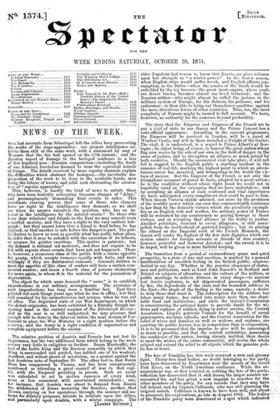The story that the Emperor and Empress of the French
are to pay a visit of state to our Queen and the Prince Consort has a semi-official appearance. According to the current programme, the Emperor will be received in London, will be a guest at Windsor Castle, and will be there installed a Knight of the Garter. The visit, it is understood, is a sequel to Prince Albert's at Bon- logne ; its object being, of course, to honour the great nation-whose flag now waves by the side of our own in the field of danger in the cause of justice, and to strengthen an alliance so much prized by both countries. Should the ceremonial visit take place, it will not fail to suggest to the English public a startling incident in the romance of real life, marking the highest point to which an adven- turous career has mounted, and trumpeting to the world the vir- tues of success. But the Emperor of the French is not only the triumphant occupant of power de facto, adopted by a great nation; he is the coadjutor without whose right hand we could not so hopefully carry on the enterprise that we have undertaken; and by accepting an alliance of such confessed and vital importance we have anticipated every compliment that could be paid to him. When Queen Victoria stands adorned, not more by the greatness of the worldly power which our own free commonwealth continues to her than by the domestic virtues which she peculiarly exempli- fies as an English wife and mother, the military power of France will be welcomed by our countrymen as paying homage to those virtues, and as accepting that alliance in the fealty to justice. Another potentate, recreant to every allegiance, is still unex- pulled from the brotherhood of gartered knights ; but in placing the riband on the Imperial neck of the French Monarch, the Queen will confer the highest of the few state dignities which our system admits for foreign servants or friends of this country, however powerful and however devoted ; and the sword, it is to be hoped, will be given to more faithful keeping.


























